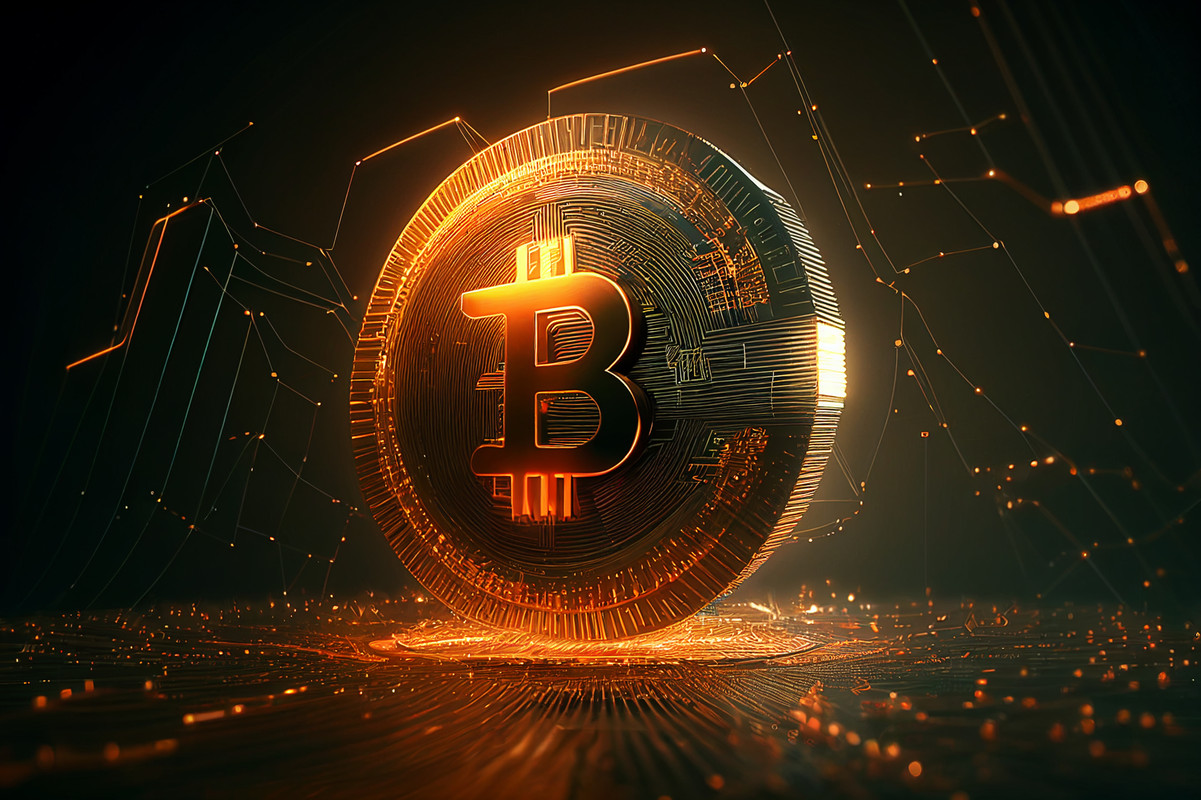What is Bitcoin?
by Admin

The emergence of Bitcoin has been a revolutionary development in computer science. It solved a fundamental problem in online commerce by allowing people to conduct financial transactions without a third party. This is beneficial in many ways, freeing people to transact without relying on governments, banks, and credit card companies. Additionally, it creates the possibility of a more decentralized, free, and innovative financial system. So what is Bitcoin?
Bitcoin is a digital currency
You've probably heard of Bitcoin and wondered, "What is it?" Well, this decentralized digital currency is a form of virtual currency that allows transactions to be made without the involvement of a bank or third-party institution. Many people have bought Bitcoin as a financial investment, hoping it will appreciate. Page One Economics recently published an article on this new financial asset. They explain why this digital currency is a good choice for investors.
The price of a bitcoin is determined by supply and demand. Since the total supply of bitcoins is limited to 21 million, this currency is extremely rare and thereby has a high value. It also doesn't have a central authority to control its supply, which makes it ripe for speculation and manipulation. However, with its fast growth, Bitcoin has made plenty of people billionaires, including Satoshi Nakamoto, the creator of bitcoin. Other notable billionaires include the Winklevoss twins, who parlayed their Facebook payout into an early bitcoin fund.
Bitcoin is an online digital currency. It is the most popular cryptocurrency, created in the aftermath of the housing crash in 2009. Because of its low transaction costs, it has quickly become a popular online payment form. Its decentralized nature makes it a popular choice for those who want to spend their money without worrying about centralized institutions. Furthermore, unlike government-issued currencies, Bitcoin is run by a decentralized authority with no central bank. The system relies on massive computing power and a network of computers to ensure that the currency network is secure.
Unlike traditional banks, which have centralized databases and a central bank, Bitcoin relies on a network of computers to verify transactions. Once a transaction is confirmed, it's recorded on a digital public ledger called a blockchain. The blocks of bitcoin transactions are linked, creating a public ledger of cryptocurrency transactions. Because a network of computers verifies transactions, the identity of the person making the transaction remains anonymous.
It is a store of value like gold
A store of value is a commodity or asset whose value remains the same over some time. Ideally, a store of value would continue to have the same value after many years. Gold, for example, has been considered a store of value for centuries. In addition to its physical value, gold has been accepted by the entire world. Unlike gold, Bitcoin does not have intrinsic value. To maintain its value, two individuals must agree to exchange one asset for another.
Many investors have sought comfort in gold in recent years. Gold has proven to be an excellent hedge during market corrections since its value remains relatively static when other assets decrease. Gold has long been seen as a safe-haven asset. However, Bitcoin is in danger of stealing gold's crown as a premium store of value. This article will explore the arguments in favor and against the store-of-value argument.
A common misconception about gold is that it is more secure than digital assets. Bitcoin is a decentralized digital asset without government or central bank control. It is managed by a global network of miners and nodes, making it more secure than traditional currencies. Bitcoin also has several other advantages over gold, making it a great value store. Unlike gold, Bitcoin is portable, fungible, and divisible. This makes it infinitely more portable and suitable for international trade.
Another advantage of bitcoin is its scarcity. Like gold, there is a finite supply of it. Bitcoin only has 21 million coins, and the earth still has a lot of gold to mine. This fact makes Bitcoin the best store of value among digital assets. The fixed supply of Bitcoin also makes it a better store of value than gold. Additionally, Bitcoin is more widely accepted as a store of value than gold.
It is decentralized
Decentralization is an important aspect of Bitcoin. It allows you to transfer value without a central bank. A peer-to-peer network called the blockchain allows for decentralized transactions to take place. In a decentralized currency, everyone owns a copy of the ledger, which makes transactions safe. In addition, bitcoins have no governing authority, which makes them very difficult to censor or shut down. This makes Bitcoin a great choice for people who want to be independent of the government.
Since Bitcoin is decentralized, it's a good choice for people who don't want to rely on a bank to process their transactions. However, you should be aware of some risks associated with using Bitcoin. In addition to being cheaper and faster than bank transfers, Bitcoin transactions are more secure. Because there's no central authority controlling the currency supply, there is no single point of failure, making it less vulnerable to hacks and other forms of fraud.
A large part of the decentralized bitcoins is due to their distributed ledger. The bitcoin network relies on a database called a blockchain. The blockchain is a public ledger in which every bitcoin transaction is recorded. The database contains a huge list of transactions and their details. Each transaction is recorded on the blockchain and cannot be changed or reversed. The ledger is kept safe through encryption, so the transactions don't get corrupted or tampered with.
The blockchain in bitcoin is completely decentralized, meaning no single entity can control the network. Since everyone can create a wallet and use it to store bitcoins, no central authority can shut down the network. This is a huge advantage because no one entity can take over the web without permission. No central authority can make or control decisions, so the process is free and transparent. This makes bitcoin a popular choice for people who want to be independent of a central authority.
It is legal in all major economies
Almost all major economies now recognize Bitcoin as legal tender. Whether this change will positively or negatively impact the currency is debatable. Some financial observers say the change is a game changer, while others are more cautious. The change could complicate matters with the International Monetary Fund. El Salvador is currently seeking a more than $1 billion IMF program. Some politicians have expressed opposition to the currency, calling it a scam and saying the dollar should remain the world's reserve currency.
While Bitcoin is not illegal in most countries, some governments do not allow it to be traded or used. China, Egypt, and other countries have banned it. The fact that Bitcoin is anonymous has also raised concerns for governments. Some legislators and officials do not approve of its use because of illicit ties. In response, many countries have enacted regulations under anti-money laundering and counter-terrorism laws. In some countries, Bitcoin is only legal for purchases, not trading.
Japan is the most progressive economy when it comes to the regulation of cryptocurrencies. The Payment Services Act states that cryptocurrencies are property. It further specifies that the digital currency can only be used as electronic property and cannot be used as legal tender. Currently, the amount of trading in Japan's online exchanges stands at $6.6 million.
This represents an increase of over 50 percent in volume compared to the previous year. The Japanese government is taking action to protect consumers and ensure that cryptocurrency trading is legal in its country.
The US and EU are also taking steps to make cryptocurrency legal. The Fifth Anti-Money Laundering Directive brought cryptocurrency-fiat currency exchanges under the purview of anti-money laundering laws. Under this law, cryptocurrency exchanges must perform KYC/CDD checks on their customers and meet standard reporting requirements. Furthermore, the Sixth Anti-Money Laundering Directive has further increased the stringency of compliance for cryptocurrency exchanges.
It is expensive
You may be wondering why Bitcoin is so expensive. Many factors go into creating a currency that costs so much. Energy consumption is an important factor in making a profitable currency, making Bitcoin expensive. The other factors include the miner's fees and rewards promised to miners. Miners are people who process transactions and confirm them, adding new blocks to the blockchain. The more people who purchase Bitcoin, the higher its price will become.
One of the reasons that Bitcoin is so expensive is that there are very few coins in circulation. As a result, this creates scarcity. In addition, people are increasingly buying Bitcoin, making it even more expensive. This trend has sparked the interest of institutional investors, who were not as interested in Bitcoin a decade ago. But now, they are buying billions of dollars of Bitcoin as part of their long-term investment strategy. This has helped push the price even higher. Some people believe that Bitcoin will eventually become the de facto digital currency.
CATEGORY: Cryptocurrency
TAGS: blockchain, Digital Currency, Bitcoin, Crypto, Investment Strategy, Trading
The emergence of Bitcoin has been a revolutionary development in computer science. It solved a fundamental problem in online commerce by allowing people to conduct financial transactions without a third party. This is beneficial in many ways, freeing people to transact without relying on governments, banks, and credit card companies. Additionally, it creates the possibility…
Recent Posts
- Trade Pro Roofing: Leading the Way in Roofing Excellence in Springdale, Fayetteville, and NWA
- Ben’s Pest Control: Your Premier Solution for Pest-Free Living
- Environmental Benefits of Removing Diseased or Damaged Trees to Promote Healthier Landscapes
- Shattered Dreams: Premier Destination for Comprehensive Computer and Mobile Device Repair Services in Knoxville
- Maintaining and Caring for Your Quartz Countertops: Tips and Tricks
